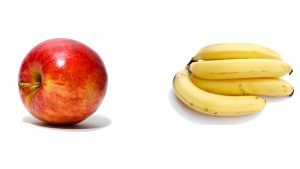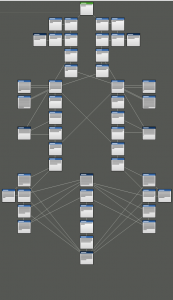Love the smell of fruit in the morning? Today is a cold day to eat fruit.
Cold Fruit is a parody of the Cold War in the perspective of competing fruit farms.
[Image used with permission from Wikimedia Commons.]
Here is an image of the story structure:


I enjoyed this, especially the escalating destruction machines. I felt as if it would be nice to have a bit more divergence in the paths. I didn’t always feel like I was able to make meaningful decisions, because one option would continue the story and another would instantly end the story.
There were a few typos:
“world is tough place” –> “world is a tough place”.
Join the BIA
Refuse to join the AGB. <– Should be BIA.
Your story feels like it’s resisting against diverging choices rather than embracing them, especially early on. It feels like I’m being pigeon holed into the particular story of arms race, and any other choice I make ends a game with a dismissive tone. Don’t say it’s intentional because that’s a massive copout. The meaninglessness of choice arises in two different ways, once in the structural symmetry of the narrative, which I appreciate, and second in the arbitrary endings of the game. Those choices should also reflect a symmetrical structure that can wrap itself back into the story.
I disagree. This branching story is very clearly trying to tell us one parallel story that is about the arms race. Most choices which were given were binary, and the side that resulted in the story ending had a very good reason for doing so that tied in to the story theme. Also, in the represented story the character was pigeon holed, so it probably purposeful that the reader feel so. For instance, if someone was asked to join the AGB and refused, I find it very plausible that they be found a threat and as such be terminated.
The concept of using two fruits is abstract but representative. I really enjoy see how two different spices interact with each us. However, I would expect more differences between them to make them feel more like two unique representatives.
I think the point is that they’re essentially identical.
Using the Jonah theme feels like the right choice, since for me it promoted a reflection at each game over as to whether there was something I did somewhere along the way to solve the problems that are present, or if any outcome is bad. Evoking the topic of mutually assured destruction was also helpful since it got me right into that mindset of questioning the limits of my influence as an individual. The only thing that was a bit confusing was that the one happy ending I found occurred after the worst-case-scenario – both sides deploying their doomsday devices – and it’s only by an unexplained deus ex machina that everyone survived. There may be a way to incorporate a happy ending into this piece, but I’m not sure if that particular one supported the experience of the rest of the game.
I like the concise summation of the cold war from an aspect standpoint of fruit. However, I felt the fruit having actions and being fruit was not explained well. You could have just as easily went with X’s and Y’s, squares and circles, or bliblabs and garbons, so why apples and banana’s? Clearly an idiomatic choice would be apples and oranges, as they are not comparable for some reason, and this would lead to the irony based in your story being entirely parallel for both sides.
Fun parallel of real life historical/current conflicts to fruit. Although the objects are lighthearted though, they seem just as violent because they’re still threatened with weapons, death, and obliteration though. Interesting choice of theme that really helps you go over the choices you made to get to where you are in the story and see the relationships that run through the apples and bananas.
I like the call out to the Cold War here. Hollah!
At the same time I wish that the player would have more of a presence in the politics. You do a great job of conveying the point, but I like apples not bananas and that sucks when apples are commies. This game was quick to play through but very successful in conveying your point. I like that it is simply written and not bogged down in political jargon, yet makes understanding history (to a degree) something easy. i can see this being used to teach kids about foreign relations at a young age.
I enjoyed the symmetry of the piece. Playing once aligned with each side, it was interesting to see the indoctrination and biased beliefs of one fruit against the other. While the arms race was amusing, I wasn’t sure if the happy ending was necessary, especially since there is no happy ending at our current stance. A more realistic resolution (the fruits lived forever in fear of each others’ WMD) might be more suitable.
I found the image to be a little ironic since the apple is alone yet works together with others in the narrative, and the banana is the opposite yet it’s pictured in a bunch. I also thought the ability to go back and undo your choices was odd in comparison to how dire some of the choices were and how impossible that would actually be. The content felt like a metaphor for the Cold War, and if that’s true, this subtlety may be lost on the less historically savvy players. Regardless, I think it’s an enjoyable and humorous system. If it is a metaphor, it tackles the issue of agency in a setting where I already know the outcome in an interesting way. I’m an active agent in the historical setting and even if I chose to follow a path I know the outcome of, I can bounce to another path and feel as if I’ve accomplished something.
I found this game to be hysterical. Your use of language is simplistic/witty and encourages playability. More so than some of the other games, I was able to see the direct correlation between the choices I made and the direction the game moved in.